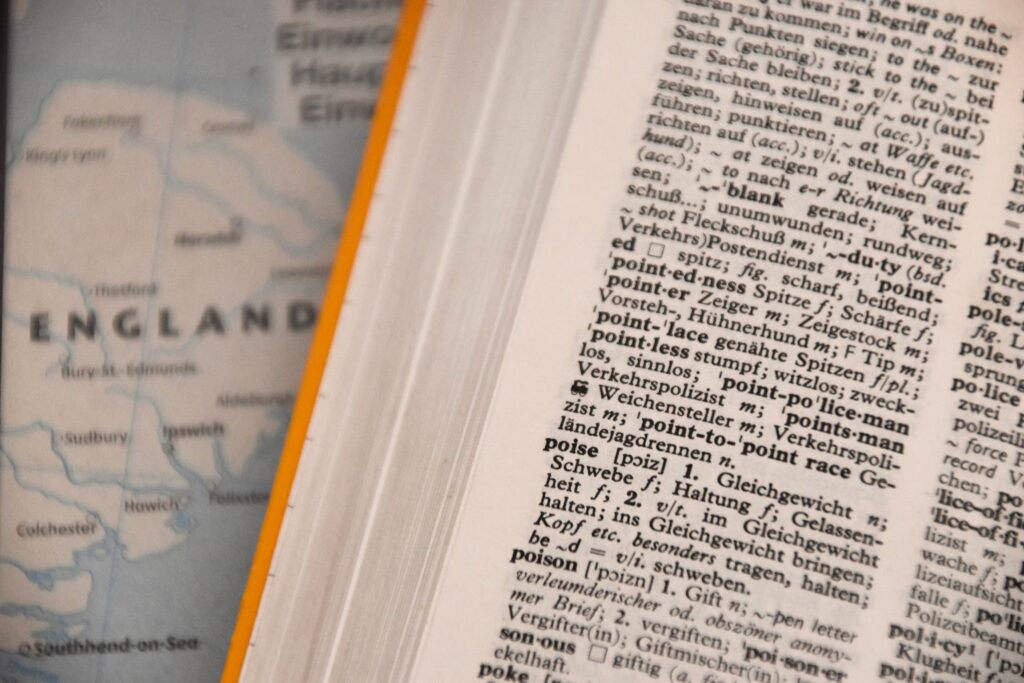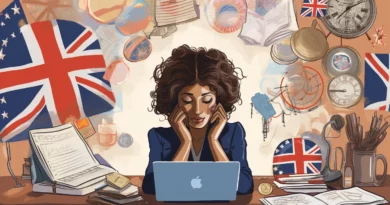Video | 7 Insanely Effective Techniques to Memorize Vocabulary in a New Language
Photo by Waldemar Brandt on Unsplash
Neste vídeo o poliglota Luca Lampariello, do canal Luca Lampariello, nos apresenta 10 técnicas incrivelmente eficazes para memorizar vocabulário em um novo idioma. Muitos alunos de idiomas nunca ouviram falar dessas técnicas ou simplesmente não sabem como usá-las. Na primeira metade do vídeo, é apresentado o conceito de rede de palavras e como você utilizar esta técnica usando uma abordagem holística por meio da audição, leitura e seleção. Isso permitirá que você entenda rapidamente a linguagem falada básica e identifique as palavras que precisa na vida cotidiana. Na segunda metade do vídeo, Luca nos mostra como usar a fórmula de associação-desconstrução-repetição dinâmica para construir uma ampla gama de vocabulário em sua memória de longo prazo. Para encerrar, são abordados os benefícios inexplorados de tomar notas e como isso pode ser usado para memorizar vocabulário de forma rápida e eficiente.
| Audio | |
|---|---|
Normal | Slow |
| English Transcript | Tradução |
| A question I get asked all the time is "Luca how can you memorize so many words across so many languages?" | Uma pergunta que me fazem o tempo todo é "Luca, como você consegue memorizar tantas palavras em tantos idiomas?" |
| And my simple answer is: "I build a word spider web", and in this video, I'm going to give you the tools to create it, to maintain it, and to make it stronger. | E minha resposta simples é: "Eu construo uma teia de aranha de palavras", e neste vídeo, vou dar a você as ferramentas para criá-la, mantê-la e fortalecê-la. |
| If I say the word "game" what is the very first thing that comes to your mind? Probably something associated with "play" - playing games - but the reality is that "game" has many other meanings. | Se eu disser a palavra "game", qual é a primeira coisa que vem à sua mente? Provavelmente algo associado a "jogar" - jogar - mas a realidade é que "game" tem muitos outros significados. |
| For example, you can say "I was hunting game", meaning "I was hunting wild animals" or "Are you game?" - like "are you down?, do you want to do something?". | Por exemplo, você pode dizer "I was hunting game", que significa "Eu estava caçando animais selvagens" ou "Are you game?" - como "você está para baixo?, você quer fazer alguma coisa?". |
| So this goes to show that many words have multiple meanings and functions according to their context and what gives them meaning? | Então, isso mostra que muitas palavras têm múltiplos significados e funções de acordo com seu contexto e o que lhes dá significado? |
| Context, that is, surrounding words. | Contexto, isto é, as palavras ao redor. |
| So, whenever you find a word that you don't know in a foreign language, always make sure that you either take the sentence in which that word is embedded and you copy it somewhere on your notebook, for example, or you create your own sentence in which you embed that word. | Portanto, sempre que você encontrar uma palavra que não conhece em um idioma estrangeiro, certifique-se sempre de pegar a frase em que essa palavra está incorporada e copiá-la em algum lugar do seu caderno, por exemplo, ou criar sua própria frase em que você incorpora essa palavra. |
| A very common mistake is for example to take all these words that you don't know from a text and simply put it on a list. | Um erro muito comum é, por exemplo, pegar todas essas palavras que você não conhece de um texto e simplesmente colocá-las em uma lista. |
| But isolated words are not as strong as words in context, embedded in sentences. | Mas palavras isoladas não são tão fortes quanto palavras em contexto, embutidas em frases. |
| Always remember that as a first rule. | Lembre-se sempre disso como a primeira regra. |
| A simple yet very effective way to memorize and learn new words is to listen while reading. | Uma maneira simples, mas muito eficaz, de memorizar e aprender novas palavras é ouvir enquanto lê. |
| Think about it for a second: you can for example read a text as a beginner material or you can have podcasts with scripts or movies with subtitles. | Pense nisso por um segundo: você pode, por exemplo, ler um texto como material para iniciantes ou pode ter podcasts com roteiros ou filmes com legendas. |
| The most important thing is that you listen while reading or reading while listening. | O mais importante é que você ouça enquanto lê ou lê enquanto ouve. |
| If you just listen to the language without subtitles or a script, you will not see the written word, you will probably not understand if you don't have a good level. | Se você só ouvir o idioma sem legendas ou script, não verá a palavra escrita, provavelmente não entenderá se não tiver um bom nível. |
| On the other hand, if you just read a text, you will not see and hear how the language is spoken, so you will miss out on the spoken language. | Por outro lado, se você apenas ler um texto, não verá nem ouvirá como o idioma é falado, portanto, perderá o idioma falado. |
| The easiest solution? | A solução mais fácil? |
| Read while listening as much as you can. | Leia enquanto ouve o máximo que puder. |
| When you read a text in a foreign language there's a very high chance that you're going to stumble upon a lot of words that you don't know. | Quando você lê um texto em uma língua estrangeira, há uma grande chance de você se deparar com um monte de palavras que não conhece. |
| A very common reaction is to try to strike and underline and look up every single word that appears on the text. | Uma reação muito comum é tentar riscar e sublinhar e procurar cada palavra que aparece no texto. |
| I don't think that this is an efficient way to deal with it. | Eu não acho que esta é uma maneira eficiente de lidar com isso. |
| A much more efficient way is to focus just on the words that are RELEVANT for you. | Uma maneira muito mais eficiente é focar apenas nas palavras que são RELEVANTES para você. |
| Let me give you an example: if you're an engineer, words such as "tile" or "pillar" will probably be much more interesting and relevant to you than if you were a doctor for example, and for a doctor some other words might be more interesting, and anyway, the brain discards a lot of words that it deems not important. | Deixe-me dar um exemplo: se você é engenheiro, palavras como "tile" ou "pillar" provavelmente serão muito mais interessantes e relevantes para você do que se você fosse um médico, por exemplo, e para um médico algumas outras palavras pode ser mais interessante e, de qualquer forma, o cérebro descarta muitas palavras que não considera importantes. |
| So just focus on ONE THIRD of the unknown words that you find in the text because the brain will remember those words if they're relevant for you. | Portanto, concentre-se em UM TERÇO das palavras desconhecidas que você encontrar no texto, porque o cérebro se lembrará dessas palavras se forem relevantes para você. |
| Heart, elephant and sand. | Heart, elephant and sand. |
| If you think about it, these simple words have a constellation of elements around them. | Se você pensar bem, essas palavras simples têm uma constelação de elementos ao seu redor. |
| For example you can say "(see) pink elephants" or "the elephant in the room", "to draw a line in the sand", "at the heart of the matter" "golden heart", and so on and so forth. | Por exemplo, você pode dizer "(see) pink elephants" ou "the elephant in the room", "to draw a line in the sand", "at the heart of the matter", "golden heart", e assim por diante. |
| This goes to show that the brain creates big networks of associated elements and this is how you can use your brain in order to start learning new words. | Isso mostra que o cérebro cria grandes redes de elementos associados e é assim que você pode usar seu cérebro para começar a aprender novas palavras. |
| Every new piece of information you can link it to old pieces of information, so always make sure that you look at words from this perspective and think "how can I associate this new piece of information to the other pieces of information?" in the network that I have talked about. | Você pode vincular cada nova informação a informações antigas, então sempre certifique-se de olhar para as palavras dessa perspectiva e pensar "como posso associar essa nova informação às outras informações?" na rede de que falei. |
| And this is the "word spiderweb" I was talking about at the beginning of this video. | E esta é a "word spiderweb" que eu estava falando no início deste vídeo. |
| Some languages have notoriously long words. | Algumas línguas têm palavras notoriamente longas. |
| Let's take the German word "Freundschaftsbezeigung" which means "display of friendship" but if you think about it, the first reaction is to get scared by he length of this word, but then when looking closely, you will realize that this word is made of "Freundschaft" - - friendship - and "Bezeigung" - or "Bezeigungen" - display, displays of". | Vamos pegar a palavra alemã "Freundschaftsbezeigung" que significa "exibição de amizade", mas se você pensar bem, a primeira reação é se assustar com o comprimento dessa palavra, mas depois, ao olhar de perto, você perceberá que essa palavra é feita de "Freundschaft" - amizade - e "Bezeigung" - ou "Bezeigungen" - exibição, exibições de". |
| This makes the word easier to retain, easier to pronounce, and easier to remember. | Isso torna a palavra mais fácil de reter, mais fácil de pronunciar e mais fácil de lembrar. |
| So get into the habit of looking at words as made of smaller parts. | Portanto, adquira o hábito de ver as palavras como feitas de partes menores. |
| If you learn how these smaller parts make longer words, things will get much easier in terms of everything. | Se você aprender como essas partes menores formam palavras mais longas, as coisas ficarão muito mais fáceis em termos de tudo. |
| Romans used to say "Repetita juvant", which means "repeating helps" and that's true, and that's what we do at college university, at school: we tend to repeat things over and over, but repeating things in the very same way in which we had been exposed to the very first time is not actually a very efficient way of dealing with texts. | Os romanos costumavam dizer "Repetita juvant", que significa "repetir ajuda" e isso é verdade, e é isso que fazemos na faculdade, na escola: tendemos a repetir as coisas repetidamente, mas repetindo as coisas da mesma maneira que que tínhamos sido expostos pela primeira vez não é realmente uma maneira muito eficiente de lidar com textos. |
| Let me give you a metaphor: imagine that you have to conquer a castle - that is, conquering the language - if you always attack it through the main door, the defendants will realize your tactics and your strategy and it will be easier to defend the castle. | Deixe-me dar-lhe uma metáfora: imagine que você tem que conquistar um castelo - isto é, conquistar a língua - se você sempre o atacar pela porta principal, os defensores perceberão sua tática e sua estratégia e será mais fácil defender o castelo. |
| If, instead, you attack the castle from multiple angles, you are more likely to win the battle. | Se, em vez disso, você atacar o castelo de vários ângulos, é mais provável que ganhe a batalha. |
| To give you a very concrete example, if you listen while reading the text the very first time that you got exposed to it, three or four days down the line, do things differently maybe just listen to the text, or just read it, or listen to it in the target language while reading it in your own native language. | Para dar um exemplo muito concreto, se você ouvir enquanto lê o texto na primeira vez que foi exposto a ele, três ou quatro dias depois, faz as coisas de maneira diferente, talvez apenas ouça o texto, ou apenas leia, ou ouça-o no idioma de destino enquanto o lê em seu próprio idioma nativo. |
| Whatever is different is relevant and it makes a big difference in the way our brain retains information because we're adding VARIETY to it. | O que quer que seja diferente é relevante e faz uma grande diferença na maneira como nosso cérebro retém informações porque estamos adicionando VARIEDADE a ele. |
| Novelty and repetition is a fantastic combination to retain words, texts, and whatever you want. | Novidade e repetição é uma combinação fantástica para reter palavras, textos e o que você quiser. |
| "Verba volant sed scripta manent", "spoken words fly while written words stay" another wise quote from the wise Romans. | De "manent volant do scripta do sed Verba", "palavras faladas voam ao passo que as palavras escritas permanecem" outras citações sábias dos romanos sábios. |
| Why is this so relevant 2,000 years ago as it is now? | Por que isso é tão relevante 2.000 anos atrás como é agora? |
| It's because words that are spoken, they just fly around the air and you need a system in place to catch them. | É porque as palavras que são faladas, elas simplesmente voam pelo ar e você precisa de um sistema para capturá-las. |
| So always make sure that you have a device, a note-taking device - be it your mobile phone or your notebook - to catch these words and these sentences on the fly. | Portanto, certifique-se sempre de ter um dispositivo, um dispositivo de anotações - seja seu celular ou seu notebook - para pegar essas palavras e essas frases na hora. |
| You can do it everywhere. | Você pode fazê-lo em todos os lugares. |
| You can do it while you're sitting and you're trying to learn the language, and you can do it while you're talking to your friends in a bar, you can do it even while walking and you come up with a word that you want to know the meaning of in a foreign language. | Você pode fazê-lo enquanto está sentado e está tentando aprender o idioma, e pode fazê-lo enquanto conversa com seus amigos em um bar, pode fazê-lo mesmo enquanto caminha e inventa uma palavra que você deseja saber o significado em uma língua estrangeira. |
| Whatever it is, just make sure that you have a notebook that you can fit in your pocket and you can carry it with you at all times. | Seja o que for, apenas certifique-se de ter um caderno que caiba no bolso e possa carregá-lo com você o tempo todo. |
| And another tip is when you mark words or sentences, always make sure that you mark the PLACE and the TIME where this happened, because it's going to give you a very clear reference in time and space for your episodic memory. | E outra dica é quando você marcar palavras ou frases, certifique-se sempre de marcar o LUGAR e a HORA em que isso aconteceu, porque isso lhe dará uma referência muito clara no tempo e no espaço para sua memória episódica. |
| It makes a huge difference if you get into the habit of doing this every single day. | Faz uma enorme diferença se você adquirir o hábito de fazer isso todos os dias. |
| This video contains a lot of information and I've condensed it for the sake of brevity and clarity. | Este vídeo contém muitas informações e eu as condensei por uma questão de brevidade e clareza. |
| If you want to know more, you can click on the link in the description box below and you will be able to read a very extensive article about this very same topic. | Se você quiser saber mais, clique no link na caixa de descrição abaixo e poderá ler um artigo muito extenso sobre esse mesmo tópico. |
| So here you have it. | Então é isso. |
| These are the seven tools to create and strengthen your "word spider web". | Estas são as sete ferramentas para criar e fortalecer sua "teia de aranha da palavra". |
| All you need to do now is to get out there and catch as many "word flies" as possible. | Tudo o que você precisa fazer agora é chegar lá e pegar o maior número possível de "word flies". |
Contagem de palavras
A tabela abaixo exibe as palavras encontradas neste vídeo, bem como o número de vezes em que aparecem.
Veja também: Para que serve esta tabela?










Excelente.